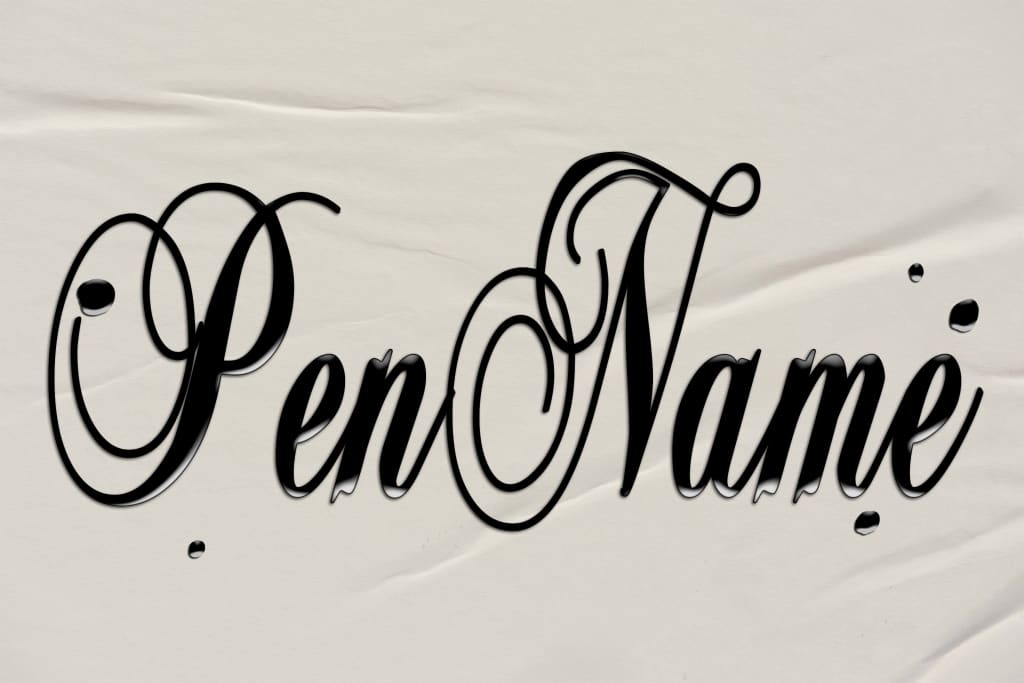Pen Name
"Originality is nothing but judicious imitation." – Voltaire

The mirror showed a reflection that wasn’t my own. The other man appeared in the mirror just as he did in the photograph on the back flap of his debut novel's dust jacket—hair mussed, fingers loosely steepled, mouth quirked at one corner. Only his eyes deviated from the photograph's bearing. Round, exposed irises darted to-and-fro, animated and incongruent with the frozen whimsy of the rest of him. The effect was cartoonish.
I knew this man. I had captured him, in a way. He was called Simon Glover, and before he was the author of a Booker longlisted but seldom-read bildungsroman, he was my student.
Of course, this was not truly Simon Glover staring back at me while I lathered soap between my palms. Not Simon Glover in his material entirety. There was another, more complete portion of Simon Glover lingering in the second-floor foyer at Cipriani South Street. I only just left him moments ago when I excused myself to the men's room, and he had looked even worse for wear than this fragmented tendril of Simon Glover in the mirror.
The Simon Glover in the second-floor foyer—hairline receded, shoulders stooped beneath the parachute of a too-big dress shirt, eyes yellow-gray in the parts that ought to have been pink-white—said he was plagued, in recent months, by inexplicable malaise. He had confided in me, a trusted mentor to whom he'd sent his early chapters, that he was tired. Uninspired. Blocked. Published just once and afraid he'd already peaked. Hounded his dream for a decade, only to deflate in the anticlimax of its fruition.
It would never occur to him that the why of it all could be anything other than his own personal failings.
Not even long after I was done with him.
"There there, Glover. Not to fret. I'll be returning you soon." I winked at the apparition in the mirror. Flicked water from my fingers. Reached for an expensive paper towel—thick layers of ply, cottony soft, anticipating the wet hands of an important person.
"Now please, don't be so vain. You're hogging the frame."
I leaned over the glossy black counter and squinted beyond Simon Glover to find myself in the illusive stereogram puzzle of our combined reflections. Using the residual moisture on the tips of my fingers, I slicked back steel-streaked hair, then adjusted the gold-plated name tag at my breast. It was special-ordered by the university for events such as these. Extra large, to fit my full name and title per my request, and because I didn't often see my given name in print, I took a moment to admire the thin slant of each letter comprising MARTIN REZNIK | LITERATURE DEPT. HEAD (backwards though they were) before tipping an imaginary hat to the other man in the mirror.
"I do wish I could stay and chat, good man, but alas it is my duty to beguile the pocketbooks of alumni such as yourself. Or perhaps just the ones with more fortune and acclaim. Oh, stop sulking. A Booker longlist is far from a flop, and no one has ever said it's talent which begets fortune. And talent, my man, you have in spades. Just look at our manuscript. Perfection. Absolute perfection."
I kissed the tips of my bunched fingers and splayed them in a classic al bacio.
"Adieu, for now, Glover."
===
The other Simon Glover, the one who existed in the material world, had been hovering at my heels all evening like a starving street dog. I wondered if he unknowingly sniffed out his lost counterpart looming in me, like lunch leftovers. Or perhaps he was just feeling unmoored in a sea of literary peers all flaunting their shiny-baubled intellects, and in his self-pitying state sought comfort in our familiarity.
But I was not here to visit with poor, dejected Simon Glover. Our work together was rounding to a close. I had no further use for him. I was ostensibly here on behalf of the private university at which I had been tenured for over a decade, to coax fundraiser guests into celebrating the literary talent churned out by our highly selective program with figures bearing enough zeroes to satiate their aristocratic egos.
But my true motives for attendance surrounded one guest, in particular, and I had just spied her evacuating the ballroom to the terrace, alone, through arched doors flanked by ivory balustrades. I made a mental note of her path.
"You're a scotch man, aren't you, Simon? You like them smokey, yes?" I asked the remora who was clung to my side.
Simon nodded, prone as he was now to my suggestion. That was an unintended quirk of my secret arts. The authors in my ensnare always wanted to please or impress me. One had even declared her love for me. Pitifully, via a sonnet that could've been written by a barely literate teenager, being that she was, of course, divorced from her muse at the time.
"You simply must try this Black Macallan. Go there," I gestured past the guests congregating in conversive clusters, "And have that gentleman behind the bar pour one for you."
"Oh," Simon looked briefly at the bar as though he had never seen one before, with an expression that suggested ordering an expensive drink, even at an open bar, might be beyond the purview of his customs. "Yeah. Of course, yeah, it looks great. Great color. I'll just be right back."
I smiled at him, the way a father might smile to encourage his son's timid approach towards a mall Santa. When his back turned, I hustled to fetch my briefcase—and its critical contents—before pursuing the young author on the terrace.
Outside, the cool maritime air gusted with lukewarm ribbons that forecasted an approaching spring. Bristol Katayama stood alone at the railing, in the far corner, staring out at the Brooklyn Bridge, its cables strung by diamonds at night. Her gown's slick satin fabric captured golden shimmers from lights winking beyond the East River.
"Excuse me—Miss Katayama?"
I approached her from the side, trying my best not to startle her, as it has been my experience that young women in solitude spook easily. A futility. At the sound of my voice, her exposed shoulders leapt briefly towards her ears.
"Yes?"
"Pardon the intrusion. It's me—Professor Martin Reznik. I'm pleased to see you've accepted my invitation, and might I confess, rather surprised to find you unburdened by swathes of adoring fans all eager to pick apart your genius."
"Well, I stepped outside for some respite," she smiled with smooth confidence and poise as she clasped my hand in greeting. "But I'm honored to be here. And of course, honored to meet the veritable Banksy of literature, in the flesh."
She smiled wryly at me. Her tone bore an unmistakable taunt. Good-natured, sure, but I bristled in spite of myself.
"Oh for goodness sake, I've always loathed that comparison. People know who I am, after all, don't they? I'm hardly half the mystery of an artist like Banksy."
I had earned the tacky title for my propensity to publish under various pen names, and never the same one twice. A comparative mode of anonymity to Banksy, in one journalist's view. And while yes, my original impetus was to remain undetected, the proclivity was also borne of a certain sentimentality—each nom de plume was a private homage to whichever muse had guided my writing hand. As my back catalog grew and my novels became more celebrated, however, publishers and agents dispersed my secret to those in the literary "know." For a small, impassioned following, the sea of annual debuts was a scavenger hunt of sorts—Which one on the shelf this year is really Martin Reznik's? The exposure was no bother, though. When questioned, it was easy enough to excuse the habit under the auspices of my professorship. What better way to inspire students to explore different voices than to be, myself, a literary chameleon?
"Well, the press does love a good gimmick." Again with that wry smile of hers. If I were a younger man I'd think she was flirting with me, but I'd long since unlearned youth's false supposition that women were kind or playful for the same reasons that men were.
Instead, I gleaned that her coyness was a kind of preemptive armor. She was clearly a gifted and adept young woman, and I knew from all of my years politicking in academic circles that she was precisely the type of person who impelled others to knock her down a peg, out of jealousy or perceived threat. She coped by taking the first jab, like a lively crack of lightning, and she had already struck the creative spark in me. I could feel inspiration coursing through my fingers. As yet only imagined, but soon to be realized.
"It's only a gimmick if it can't stand on the legs of its own talent," I volleyed back.
"And here I was, assuming a man who didn't seek acclaim under his own name might be humble."
"Well then, you were mistaken." I adjusted my tie with theatrical pomp. As I did so, Katayama seemed to notice that my other hand was encumbered. Her eyes flicked to the briefcase I still held.
"Ah-ha, your true motives are finally revealed! Is that where the donation checks go?" She asked, arching a thin eyebrow.
"Oh no, that would be rather gauche, wouldn't it?" I chuckled. "I assure you I have not drawn out New York's most esteemed new author just to pry at her pursestrings. Actually..."
I carefully balanced the briefcase upon the wide balcony railing, popped open the metal hasps, and withdrew a pen and hardback. The book was her recent debut—a spellbinding tapestry, weaving together the overlapping lives of three generations of Japanese-American women. The novel employed clever devices of history and scientific discovery with seamless precision, and was written in such utterly succulent language that during my first read-through, I had salivated all over its pages.
Katayama arranged words like an impressionist painter deposits individual brushstrokes, each one a perfectly placed fragment in a mosaic landscape of prose. Her writing might seem rudimentary in isolated snippets, but it was entirely textured and hypnotic as a whole. It had earned her the rare dual achievement of impressing both the high-brow erudites, as well as the consumptive masses. Her evocative, archetypal and yet entirely original story was a New York Times Bestseller for eighteen weeks running. Every author in the crowd this evening bled in secret when they saw her, impaled by the thorny thrust of envy.
I simply had to have her.
"I was wondering if you might sign this for me. I'm something of a... collector."
I held out the pen and the book, grinning in an abashed way that I hoped was endearing to her.
"Of course you are, professor." She laughed with two syllables.
But it was clear that she was chuffed, and she took the pen and signed her name right there on the inside cover. A lovely, looping B. The big K with an arch at its belly. Little T's crossed high above the heads of their neighbors. The little Y wearing a dramatic, swooping tail. Utterly delectable.
"I can't believe you've been carrying my book around with you all evening. Have you no dignity?"
"None at all, I'm afraid."
===
I arrived home in the early AM hours, but New York's noises have always been unconcerned with time. As I made myself comfortable on a cold leather sofa, car horns shrieked and pedestrians yowled far below my window. I jabbed at my CD-player's remote control and willed Bach's thunderous Toccata and Fugue in D Minor to drown out the cacophony.
A gold-framed mirror, angled slightly downwards above the mantle of a lit fireplace, showed my reflection painted in gothic shadows and flickering amber light. I watched my elbows flourish to wave the creases out of a linen dinner napkin in my clutch. Watched my hands tuck its corner into the high collar of my starched shirt. Simon Glover was there too, although he was fading already. A translucent overlay.
On the coffee table, Katayama's book lay on its back. The cover wore luscious, juicy pastels—the hues you might see on candy wrappers for flavors like strawberry kiwi and lemon guava. Gingerly, as though it were an artifact in a museum, I exposed her author bio in the back.
In the photograph, Bristol Katayama's dark hair was cropped short. Not the sleek, shoulder-length bob she'd donned at the fundraiser. A pity. I liked the way it had caught triangles of light, like wet sealskin. She was still a pretty thing to look at though, with warm crinkles in the corners of her oval-shaped eyes. Delicate nose, shiny mouth, a smooth swan's neck. Hers would be a pleasant departure from Simon Glover's impish, ruddy face.
I snatched the book off the table and ran my nose along its inner crease, coaxing my hunger with the sweet, woody smell of new paper, the ferrous scent of freshly printed ink.
In the mirror above the mantle, my mouth began to change.
My lips swelled and looked rather comical at first, like a pouty gourami, but next the membranes and bones lining the cavern of my mouth stretched to create a much larger hollow, and my lips thinned around its circumference. All of this was in order to make room, of course, for my teeth, which then elongated and pointed their blunt ends, transmuting into arrowhead shapes with finely serrated edges.
As this occurred, Simon Glover, at last, fully departed from my reflection. I swallowed the very last whispers of his grandiloquent wordsmithing, his unquenchable maximalist thirst for every perfect metaphor.
My appetite lusted for Katayama's sparse precision.
I snapped her book shut and bit into its corner. Cover-to-cover, with all 342 pages between. Like a hamburger.
I churned my jaw, masticating the paper to pulp to paste. One sticky swallow ushered the goop down my gullet.
I took a larger bite.
Microscopic sinews of lignin and cellulose stuck to my molars. Gooey resins and acidic pigments dissolved in an enzymatic wash of saliva. Mm, what a revelation! Katayama's descriptive invocations of the chemical world danced across my tongue.
The familiar photograph of Bristol Katayama surfaced in the mirror. A still body floating up, up, up from a pond's murky depth.
There was the low collar of her plum shirt, the unlined arc of her long neck. A barrier of twin clavicles between them.
There were the defined contours of her exposed ears. Strangely rippled, like bunched silk.
I chewed and chewed, until her pristine complexion was opaque.
I chewed and chewed, savoring her clever use of repetition.
I licked powdery crumbs of pulp from my thumb.
Bristol Katayama's muse ballooned inside of me like an overfed algal bloom.
I picked up a pen.
About the Creator
Reader insights
Outstanding
Excellent work. Looking forward to reading more!
Top insights
Compelling and original writing
Creative use of language & vocab
Excellent storytelling
Original narrative & well developed characters
Easy to read and follow
Well-structured & engaging content
Masterful proofreading
Zero grammar & spelling mistakes






Comments (13)
Devouring your muse, maniacal, insane, driven, inspired. Transcendent writing!
Fantastic! The anticipation of something sinister brewing led perfectly into the ending, which still managed to be a shock.
I appreciated the way you used symbolism to convey deeper meanings and themes throughout the story. Good luck in the competition!
Killer story! Unique play between vampiric lore and King’s Dark Half. Very well done tale
Goodness me. Felt that like a punch in the kidneys! Consumptive in every way. I could bathe in some of those words... they truly fragrance my screen! Gorgeous. Completely soakableinable. ❤️
Wow! 😍 Loved this! As always, your prose is sooo captivating! I really loved this unique take on the challenge and the ending was very creepily done with the chewing 😅 I got the chills for sure!
This was a very good story I really enjoyed reading
This is exquisitely creepy and such an imaginative take on the challenge! You've really captured the often predatory/exploitative nature of the art world here.
Loved this. Your dialogue is so well done that I felt I was standing on that terrace listening in.
Chomp chomp. Love it.
Love this. It’s like a creepy version of The Incredible Book Eating Boy.
Good use of vivid descriptions that brought the story and characters to life. Thank you for sharing!
Nice Storytelling ❤️✨😉👍